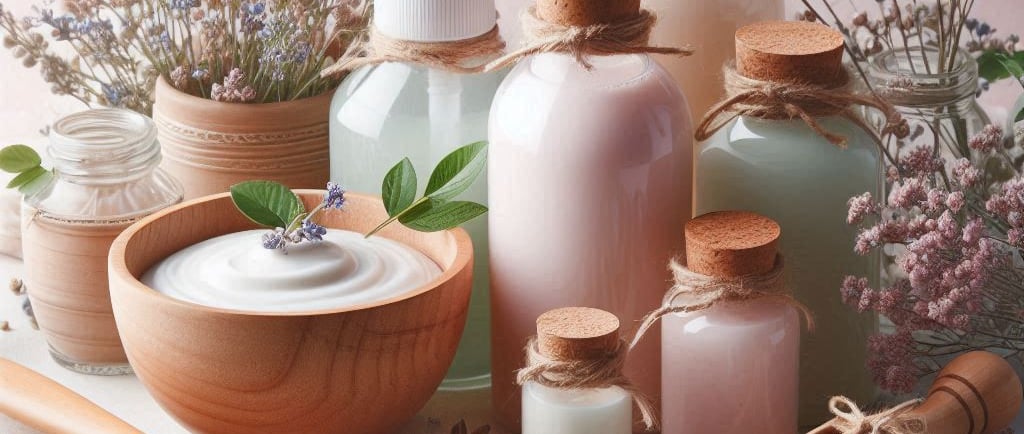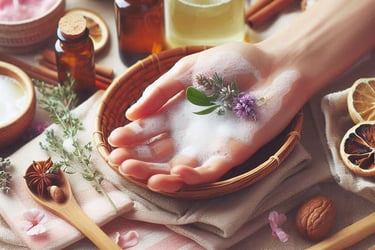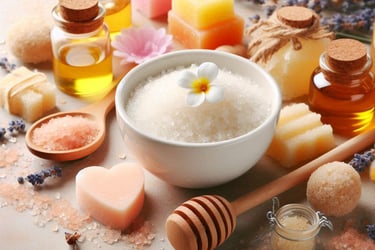Lesser Known Herbs for Radiant Skin: Easy Recipes for Every Skin Type
Explore the unique benefits of these lesser known herbs, learn how to incorporate them into your regimen, and achieve radiant, healthy skin naturally.
SKINCARE
Kathrine-Anne Hill
8/18/20248 min read


Introduction to Natural Skincare with Herbs
In recent years, there's been a noticeable shift towards natural skincare, largely fueled by a growing awareness of the benefits herbs bring. Unlike many conventional products packed with chemicals and synthetic additives, herbal remedies offer a plant-based, gentle yet effective alternative for skin care. These natural ingredients are loaded with vitamins, antioxidants, and essential oils that nourish, hydrate, and protect the skin—making them a powerful addition to any skincare regimen.
When choosing herbal skincare, it's important to understand your unique skin type. Every herb has specific properties suited to different needs, whether your skin is oily, dry, sensitive, or a combination. For example, chamomile is well known for its calming effects, making it ideal for sensitive skin, while rosemary’s antiseptic qualities can be a game changer for oily or acne-prone skin. This personalized approach ensures that your skin benefits from the herbs without any unwanted irritation or mismatches.
Beyond catering to specific skin concerns, herbs offer broader advantages. They often work in harmony with the skin’s natural functions, promoting a healthier, more radiant complexion without the side effects linked to chemical-laden products. Plus, turning to herbs for skincare supports a more eco-friendly and sustainable lifestyle. Many of these herbs can even be grown at home, benefiting both personal wellness and the planet.
Embracing herbal skincare means acknowledging the deep connection between nature and well-being, and recognizing how plant-based remedies can enhance natural beauty. By understanding what your skin needs and choosing the right herbs, you can create personalized, therapeutic skincare solutions that reflect the enduring wisdom of natural ingredients.
Herbs for Dry Skin: Hydration and Nourishment
Dry skin needs a little extra care to stay hydrated and nourished, and some herbs can really make a difference. Marshmallow root, calendula, and chamomile are three great options, each with their own unique ways of moisturizing and soothing your skin.
Marshmallow root is famous for being mucilaginous—basically, it’s got a rich, gooey texture that works like a natural moisturizer. It helps to deeply hydrate and forms a protective layer to keep the moisture locked in. Calendula, on the other hand, is great for soothing dry, irritated skin, thanks to its anti-inflammatory and healing qualities. And then there’s chamomile, a gentle herb known for calming the skin and offering a light touch of moisture, perfect even if your skin is sensitive.
If you want to bring these herbs into your skincare routine, one easy way is by making a simple herbal-infused oil. All you need to do is grab a handful of dried marshmallow root, calendula petals, and chamomile flowers, toss them into a jar, and cover them with a carrier oil like jojoba or sweet almond. Seal the jar and let it sit in a sunny spot for about 4-6 weeks, giving it a shake now and then. Once it’s ready, strain the oil and use it as a nourishing treatment for dry skin.
You can also make a hydrating face mask by mixing 2 tablespoons of the herbal-infused oil with 1 tablespoon of honey and 1 tablespoon of yogurt. Spread the mixture on clean skin and let it sit for about 15-20 minutes before rinsing off with warm water. The herbs hydrate, the honey soothes, and the yogurt gives your skin a gentle exfoliation.
If you’re looking for something richer, try making a moisturizing cream. Melt 1/4 cup of shea butter with 1/4 cup of coconut oil in a double boiler. Once they’re melted together, stir in 2 tablespoons of the herbal-infused oil. Let it cool, then store it in a jar, and you’ve got yourself a deeply hydrating cream for daily use.
By incorporating these herbal remedies into your skincare routine, you’ll be giving your dry skin the nourishment it needs for a healthier, glowing complexion.
Herbs for Sensitive Skin: Soothing and Calming
Caring for sensitive skin can be challenging, but fear not! Certain herbs can be incredibly beneficial in maintaining its comfort and happiness. Licorice root, aloe vera, and peppermint are the ultimate natural trio for skin care. They are rich in properties that combat redness and irritation effectively.
Licorice root acts as a skin savior with glycyrrhizin, a potent anti-inflammatory agent. For application, steep some pieces in hot water as you would with tea, let it cool, and then apply it to your skin with a cotton pad for a soothing toner.
Aloe vera is renowned in the realm of sensitive skin care for its anti-inflammatory and antioxidant components that provide a calming effect akin to a day at the spa. Extract fresh gel from the plant or use a store-bought version, blend it with a little chamomile oil, and apply generously for a hydrating and comforting treatment.
Peppermint, with its menthol content, acts as a natural coolant for the skin. Create a homemade balm by melting beeswax with coconut oil, adding a bit of peppermint oil, and allowing it to set. Apply this to irritated areas for immediate relief.
Utilizing these herbs is akin to granting your skin access to an exclusive relaxation zone. They synergize to keep your skin soothed and safeguarded. Crafting these simple remedies at home is not only easy but also more enjoyable than using generic commercial products. Treat your skin to the nurturing touch of nature and revel in its radiance.
Herbs for Oily Skin: Balancing and Clarifying
Tackling oily skin can be challenging, but don't fret! Incorporating some nifty herbs into your skincare regimen can make a significant difference. Witch hazel, thyme, and rosemary are three herbal heroes for your complexion.
Witch hazel acts as a natural astringent and oil controller for your pores, thanks to its tannins, which are not only oil-regulating but also calming for the skin. For application, blend a bit of witch hazel extract with distilled water to create a homemade toner. Apply it with a cotton pad to manage shine and maintain a fresh-looking skin.
Thyme is excellent for combating stubborn acne. It operates like an antibacterial agent. You can create a simple toner by steeping thyme leaves in boiling water, cooling it down, and then using it as a facial mist. This provides a revitalizing touch that helps keep oiliness and impurities in check.
Rosemary stands out for oily skin due to its antimicrobial and antioxidative properties, functioning as a skin enhancer by promoting blood circulation, ensuring your skin receives essential nutrients. For a homemade mask, combine crushed rosemary leaves with bentonite clay and water. Apply it, relax for 10-15 minutes, and then rinse with warm water. Your skin will feel refreshed, cleaner, and less greasy.
These herbal remedies are fantastic for maintaining optimal skin health without resorting to harsh chemicals. Try them out and observe your skin transition from overly shiny to radiantly glowy. Embrace the power of nature for your skincare.
Herbs for Balanced Skin: Maintenance and Enhancement
For those looking to maintain fresh and fabulous skin, incorporating herbs into your skincare routine can be transformative. Lavender, rose, and green tea form an excellent trio for skin health.
Lavender acts as a calming agent for the skin, effectively soothing irritation or redness and is rich in antioxidants that promote the skin's renewal process. It's ideal for those with sensitive complexions.
Rose serves as a superior skin moisturizer, akin to quenching your skin's thirst, encouraging it to radiate. Its antioxidants combat harmful free radicals that contribute to aging, making it perfect for retaining a youthful appearance.
Green tea is not only a beverage but also a potent skincare ingredient. Its polyphenols act as skin protectors, regulating oil production, shielding from sun damage, and combating environmental pollutants. Additionally, its antioxidant properties offer a dual benefit.
To incorporate these herbs into your skincare, consider these simple DIY recipes:
1. Create a lavender face mist by blending lavender essential oil with water for a refreshing spritz.
2. Develop a rose-infused toner to enhance skin hydration and radiance by steeping rose petals in water, cooling, and applying post-cleansing.
3. Indulge in a green tea face mask by combining matcha powder with honey and yogurt for balanced, clear skin.
Embrace these natural skincare heroes and discover their transformative effects on your skin.
Herbal Mist
For a delightful refreshment, take a cup of distilled water and add a few tablespoons of dried lavender and rose petals. Allow them to mingle for about thirty minutes. After their infusion, strain the liquid and pour it into a spray bottle. A gentle mist on your face in the morning or any time during the day will help keep your skin looking vibrant and fresh.
Nourishing Cream
To create a super moisturizing cream, grab about a quarter cup of shea butter and mix it with a spoonful of oil that's been chillin' with some green tea leaves for an hour or two (basically, you just let the leaves soak in the oil to give it that tea-time vibe). Then throw in some lavender essential oil, like a few drops, and blend it all together until it's nice and smooth. Slap this goodness on your face every night, and boom, you're giving your skin a hydration party and helping it bounce back like it's a yo-yo.
Refreshing Mask
For an instant skin refresh, consider this simple homemade mask! Take two spoonfuls of rose powder, a scoop of yogurt, and a bit of honey. Apply it to your face and relax for about 15 to 20 minutes. It's akin to treating your face to a spa day! This mask will calm any redness, moisturize dry areas, and leave you looking as if you've just had a restorative beauty sleep.
Plus, to maintain that radiant glow, remember to incorporate lavender, rose, and green tea into your skincare regimen. They're the ultimate trio for maintaining a balanced, bright, and exceptional complexion. Trust me, your skin will be grateful!
Tips for Using Herbs Safely and Effectively
Incorporating herbs into your daily skincare routine can significantly enhance it, but caution is key, akin to sampling a new ice cream flavor to avoid an upset stomach. Begin with a patch test, akin to a preliminary trial, by applying a small amount of the herbal product to a discreet area of your skin, such as the inside of your wrist, and observing for any adverse reactions over a day.
When purchasing herbs, prioritize freshness and quality, akin to selecting your preferred snacks. Opt for reputable stores that provide detailed information about the herbs' origins and processing. Organic herbs are a bonus, indicating they are natural and free from chemicals, which is beneficial for your skin.
To maintain the freshness of herbs, store dried varieties in airtight containers placed in a cool, dark area, away from sunlight. Fresh herbs should be refrigerated and used promptly, as their potency is akin to that of fresh bread.
As you prepare your skincare blend, approach it as a chef tailoring a dish to your skin's needs. Different herbs cater to different skin types; for oily skin, witch hazel or rosemary might be ideal, while calendula or chamomile may be better for dry skin. Adjust the 'recipe' to meet your skin's specific requirements.
However, before experimenting extensively, consider consulting professionals, such as dermatologists or herbal experts, particularly if your skin has unique conditions.
Related Posts:
5 Herbal Remedies for Clear and Glowing Skin: Simple Recipes with Common Household Ingredients
How to Create a Lavender Lotion at Home and It's Benefits
The Ultimate Guide to Natural Cleansers: 10 DIY Face Wash Recipes for Every Skin Type
DIY Homemade Body Scrubs with Common Grocery Store Ingredients
DIY Body Butters with Herbal Infusions: Natural Care









